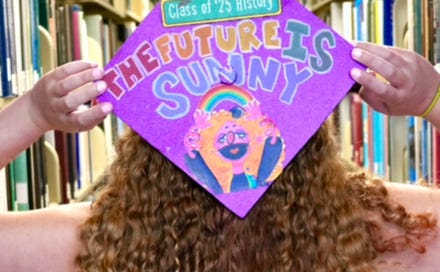Remember when everyone thought the world was going to end with Y2K? I don’t because I wasn’t born, but my dad used to play a game with me and my brother where we pretended we were stocking a bunker in preparation for the end of the world and I thought it was hilarious. Remember when everyone thought the world was going to end in 2012? I also don’t remember that because I was nine and didn’t have internet access but people still kind of joke about it. The point is that the world did not end and now people find it funny that we thought it was going to. Sesame Street came about at a time where the world also kind of seemed like it was ending in a bunch of different ways. Clearly, the world didn’t end when kids of all races started playing together or when a stay-at-home wife went back to work, but people thought it might. This is one of the many things that I talk about in my very long thesis. I spent November to April doing all of my research and writing and edits and revisions and final submission. It doesn’t sound that crazy, but it was. Imagine reading like a thousand pages a week of internal documents from the team behind Sesame Street and then working that into your own argument all while doing other classes and working and volunteering and going to karate at least two days a week. It was tough to get through. However, I could not be happier with the end result. I took a class that was called “Making History Popular” which in part inspired me to start my radio show and Substack, but it also really encouraged me to write about history for people who aren’t historians. In writing “The Future is Sunny”, I focused a lot on writing about the history of Sesame Street in an accessible way. I want people who grew up watching Sesame Street (so like a majority of Americans under 55) to relate to parts of it. I ultimately hope that in reading my thesis you realize that a lot of the little experiences you might have had like listening to “Rock Bottom” by KISS in the back of a Mazda on repeat from 2003 to at least 2007 (not specific at all) can be historically relevant. Considering pop culture as history means coming to terms with that history is more than the major news headlines, but also just daily life. Most importantly, it demonstrates that pop culture is more than just media; it carries meaning, feelings, stories, lessons, and so much more.
This is the last history class for at least two months. I graduate in five days and then I start my full time summer job immediately after. The exciting news that I’ve definitely mentioned is that I’m going to grad school! I’m going to be getting my master’s in history from San Diego State starting in August. This means I’m not quite done yet. This all goes back to “Making History Popular” and kind of figuring out that the stuff I’m interested in is actual history. On the first day of class, my professor said something like “history starts yesterday”, indicating that there isn’t an age that makes something history. To date, I haven’t taken a class that talks about history in detail past the mid-1970s. I’m excited to use my master’s as a reason to break into the more modern histories I didn’t get to touch in all my other years of school, so watch out Ronald Reagan. However, this post is really to make the thesis I spent months on public and thus available to exactly the people I want to read it. Hopefully, it’ll tide you over until I start up history class again in a few months. Lastly, thank you to all of my readers for allowing me to run this project for almost a year. I didn’t know what history class would actually be, but I’m very happy it turned out like this. Consider this your summer break and my thesis required (not really) reading and I’ll see you again in the fall for a new year of history class!



